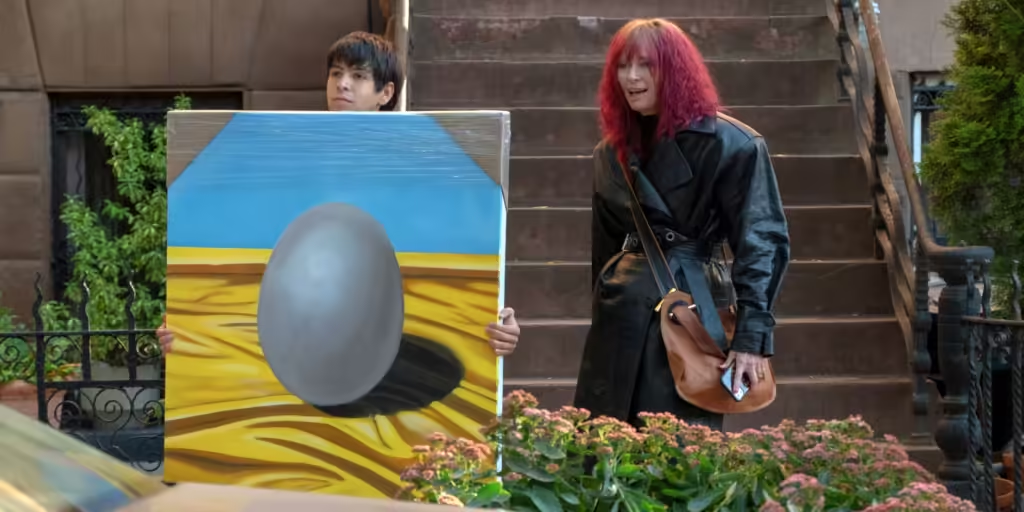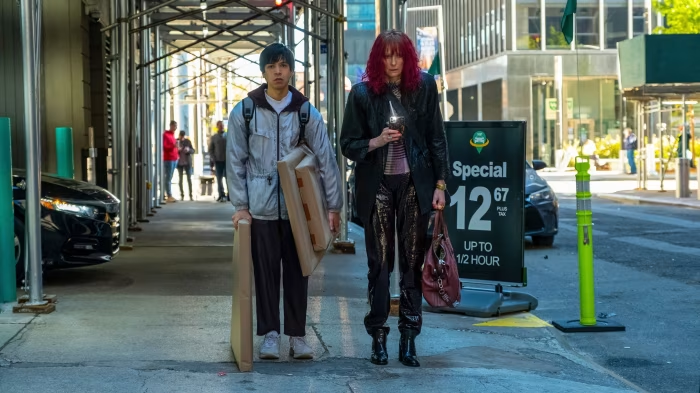Writer: Julio Torres
Director: Julio Torres
Cast: Tilda Swinton, Julio Torres, RZA, Greta Lee
Julio Torres makes a stellar debut as a writer, director and star in “Problemista,” a uniquely funny, delightfully whimsical, and smart odyssey through art, connection and perseverance. Best known for creating the TV show “Los Espookys,” Torres now takes on the big screen, playing Alejandro (or Ale), a Salvadoran immigrant with dreams of designing toys for Hasbro, however, Ale’s aspirations are thwarted by the complexities of the American immigration system, as his work visa begins to run out before he can fully realise his dreams.
In a twist of fate, Ale’s salvation comes in the form of Elizabeth (Tilda Swinton), an eccentric and brash art critic. She hires him for a job that, with some frantic effort and computer cataloging skills, becomes his last hope of staying in New York City and fulfilling his ambitions. Elizabeth, with her unpredictable nature and lofty demands, proves to be both a challenge and a gateway for Ale, pushing him into the surreal and often absurd world of high art.

Torres’ brand of magical realism is both confident and aware of its impact, making “Problemista” feel like a relative to The Daniels’ “Everything Everywhere All at Once.” The film’s fierce confidence and unique approach to storytelling, grounded in surrealism, make it a big swing that pays off. Torres’ directorial style is a beautiful blend of deadpan humor, quick cuts, and whimsical imagery. This visual and narrative style transforms the mundane struggles of immigration and artistic pursuit into an enchanting tapestry of bizarre, yet heartfelt moments.
Torres’ writing complements his direction, playing with surrealism and absurdism. The script is at times enigmatic, requiring viewers to catch up visually and auditorily to fully grasp the moments. Yet, it’s consistently laugh-out-loud funny and achingly true to the struggles of immigration, the pursuit of dreams, and the power of formative bonds. The dialogue, peppered with witty exchanges and profound insights, keeps the audience engaged and reflective.
The lived experience Torres brings to his writing is undeniable, coupled with a broad and enchanting imagination that captivates audiences. The film’s characters, from the central Ale and the unpredictable Elizabeth to apathetic roommates and an unforgiving former boss, punctuate the unique version of New York City Torres envisions, pushing it into fairy tale or mythos territory. Each character, no matter how minor, adds a layer of depth and color to the narrative, enhancing the overall richness of the film’s world.
Elizabeth’s character, played masterfully by Swinton, is particularly notable. She embodies the chaotic spirit of the art world, a whirlwind of eccentricity and passion that both baffles and inspires Ale. Her dynamic with Ale is a highlight of the film, blending moments of genuine mentorship with hilariously outlandish demands. Swinton’s performance adds an extra dimension to the film, grounding its whimsical elements in a palpable emotional reality.

The performances elevate Torres’ approach, bringing vibrant life to his already lively characters. Alejandro’s journey is not just about staying in New York, but about finding his place in a world that often seems indifferent to his dreams. His interactions with Elizabeth, his roommates, and various other characters paint a picture of resilience and determination, underscoring the film’s central themes of perseverance and hope.
“Problemista” is about making art out of life’s challenges, and the combination of inventive direction, a spirited script, a colorful cast, and a wonderfully surreal perspective solidifies this message. The film is also a commentary on the bureaucratic labyrinth that immigrants face, and it does so with a blend of humor and heart that is both poignant and entertaining. Heartfelt from the start, Torres’ directorial debut will undoubtedly resonate and inspire viewers to navigate their own life odysseys with the same determination as Alejandro.
The film’s cinematography deserves special mention. The visual style is a feast for the eyes, with vibrant colours and imaginative set pieces that transport viewers into Torres’ whimsical world. The use of magical realism is not just a stylistic choice but a narrative device that enhances the storytelling, making the ordinary seem extraordinary.






















